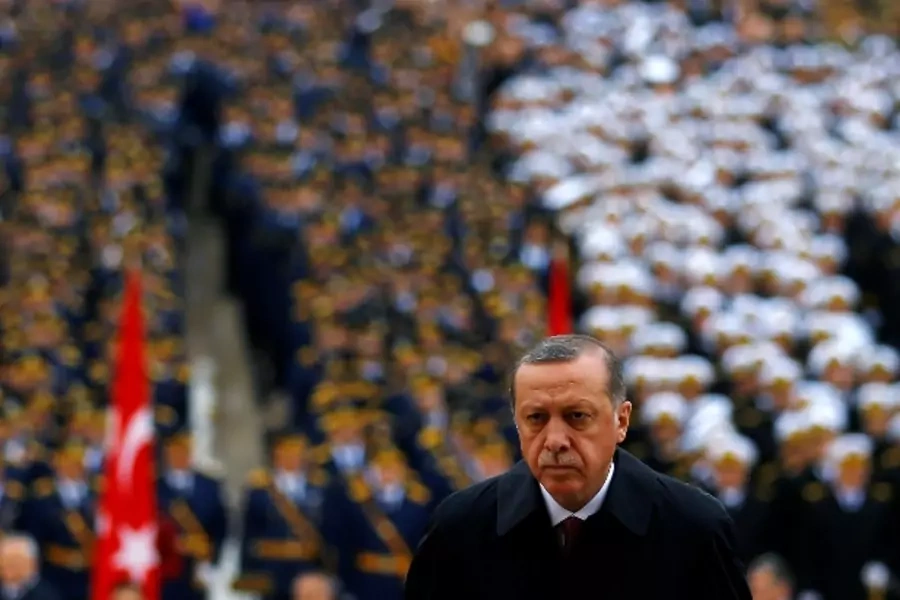Turkey-EU Trade on Tenterhooks? Faltering Membership Talks Threaten Economic Ties

Sabina Frizell is a research associate in the Civil Society, Markets, and Democracy Program at the Council on Foreign Relations.
After yesterday’s assassination of the Russian ambassador, Turkish officials were quick to place blame on Fetullah Gulen, an exiled religious leader and one of President Recep Tayyip Erdogan’s strongest critics. Erdogan is sure to use the attack as yet another justification to silence dissenting voices in the name of security. His ongoing crackdown further diminishes Turkey’s prospects for joining the European Union (EU), following the European Parliament’s overwhelming vote on November 24 to suspend membership negotiations.
More on:
While the European Parliament’s vote was largely symbolic, it adds urgency to the question of whether, after decades of Turkey’s slow progress toward membership and ten-plus years of stop-and-start negotiations, the EU should continue membership negotiations.
Most analysts have focused on what ending the talks would mean for the EU-Turkey migrant deal, Turkish democracy, and already-deteriorating human rights under Erdogan. However, the effect on trade issues has been largely overlooked. Turkish and EU economies are deeply intertwined despite mounting political tensions. In considering membership negotiations, the EU must take trade into account, as ending talks would undermine these mutually beneficial economic linkages.
Fifty Years in Waiting
Understanding the current crisis requires an appreciation of Turkey’s long, faltering path toward membership—and of the negotiations’ futility. With or without the talks, Turkey is highly unlikely to become an EU member in the foreseeable future. The EU has always been reluctant to grant Turkey membership, due partially to legitimate concerns about governance, but also to cultural and religious prejudice. EU membership negotiations are based on the Copenhagen Criteria, composed of thirty-five chapters outlining the principles and standards with which all candidate countries must comply. Throughout the 2000’s, Turkey made substantial progress on these criteria. It solidified what the EU deemed a “functioning market economy” that could withstand competitive pressure within Europe, and afforded greater freedom and rights to ethnic and religious minorities. But Europe justifiably expressed concern about overly broad antiterrorism laws, insufficient measures to fight corruption, and the lack of an independent judiciary.
However, there is also evidence that Europeans hold Turkey to more stringent standards than other candidate countries. As Turkey made progress on the Copenhagen Criteria, perhaps faster than expected, some European politicians pointed to “cultural differences” and claimed that Turkey is in some indelible way “not a European country.” The hesitation to support Turkey’s membership revealed anti-Muslim sentiment that likely undermined the accession process all along.
In light of this reluctance, Erdogan’s backtracking on democratic progress makes accession nearly impossible. In the past month, Erdogan’s government has gone further than ever to quash dissent by dismissing thousands of workers, shutting down dozens of news outlets, and jailing journalist and opposition leaders. The ruling Justice and Development Party (AKP) looks set to issue a referendum that could allow Erdogan to stay in office until 2029, and Erdogan raised the possibility of reinstating the death penalty—which would be a deal-breaker for the EU.
More on:
Trade Matters
Though negotiations are currently at an impasse, they help to maintain fraught but vital trade ties between Turkey and the EU. Without the talks, the cornerstone of their trade relationship, the EU-Turkey Customs Union could crumble, harming both economies.
The Customs Union, established in 1995, eliminated customs duties and other import restrictions on trade between Turkey and the EU. Though several major sectors were exempt, the union was a boon to the manufacturing sector for both parties. It increased trade between the EU and Turkey fourfold and triggered a similar rise in foreign investment flows to Turkey. Research shows that Turkey improved its competitive advantage for dozens of different products since 1995. The union also provided an impetus for broader trade facilitation and customs reform, which helped Turkey open up to the world and achieve 6 to 9 percent growth in gross domestic product (GDP) from 1995 to 2005.
For the EU, Turkey became an increasingly important part of supply chains. German companies especially rely on Turkey to produce unfinished parts of goods that are then imported and incorporated into final products. Germany’s metal, chemical, and automobile sectors all draw heavily on Turkish imports.
Despite its benefits, the Customs Union is an unequal agreement. Ankara is obliged to comply with the EU’s trade agreements with third-party countries and open up to those markets—but as a non-EU member, it is not granted a seat at the negotiating table. This leaves Turkey deprived of the ability to govern its own trade future. The union was intended as an interim step toward full membership. But if the EU takes membership off the table, it is hard to imagine that Erdogan would continue to accept these debilitating conditions indefinitely.
What would happen if membership talks were suspended and the Customs Union abolished? On the EU side, the move would fragment manufactured goods production. For Turkey, the effects would be much more significant. About 60 percent of its exports are to Europe, representing 12.5 percent of GDP. Diminished ties with its top trade partner could threaten not only Turkey’s economy, but its long term security. Research shows that countries with open economies are less likely to experience internal conflict—and given the Syrian civil war’s spillover and Turkey’s ongoing conflict with the Kurds, the country’s security is already tenuous. As Turkey’s security is tied to that of Europe, maintaining stability should be a top priority for the EU.
Recent coverage of EU-Turkey talks tends to ignore consequences for trade, and by extension, Turkish stability. Freezing negotiations and thus endangering the Customs Union would damage Turkey’s already-flailing economy. Amid Turkey’s democratic retreat, it may be too late for Europe to shed its prejudice and seriously consider Turkey’s candidacy. However, ending talks now would be a mistake without a day-after alternative to ensure trade endures.
 Online Store
Online Store